We are pleased to announce the 2021 Association for Mormon Letters Awards finalists in Creative Nonfiction and Religious Nonfiction, as well as a special award in nonfiction for Kristine L. Haglund. The winners will be announced and award citations presented on July 23, as part of the Association for Mormon Letters Virtual Conference. The finalists and winners are chosen by juries of authors, academics, and critics. The announcements include descriptions of the works, usually adapted from the creators’ websites.
Creative Nonfiction
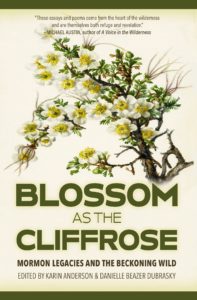 Karin Anderson and Danielle Dubrasky, editors. Blossom as the Cliffrose: Mormon Legacies and the Beckoning Wild. Torrey House Press
Karin Anderson and Danielle Dubrasky, editors. Blossom as the Cliffrose: Mormon Legacies and the Beckoning Wild. Torrey House Press
This dynamic collection demonstrates the breadth, complexity, and diversity of a Latter-day Saint legacy of commitment to natural place and challenges us to examine the myriad ways our own deeply rooted heritage shapes our personal relationship with landscape. It features original poems and prose by talented writers who are faithful, non-faithful, believers, heretics, converts and de-converts of the Mormon faith.
Karin Anderson is a professor of English at Utah Valley University where she focuses on creative writing, lit theory, wilderness and environmental writing, LGBTQ lit, contemporary narrative genres, and honor legacies. She has been nominated for a Pushcart Prize and holds degrees from Utah State University, BYU, and the University of Utah. The author of the novel Before Us Like a Land of Dreams.
Danielle Beazer Dubrasky directs the Grace A. Tanner Center for Human Values and is an associate professor of creative writing at Southern Utah University. She holds a PhD in creative writing from the University of Utah and an MA in English/creative writing from Stanford. She is lead author of a poetry curriculum published by the Journal of Poetry Therapy. Her chapbook, Ruin and Light, won the 2014 Anabiosis Press Chapbook Competition and her poems were published in Invisible Shores, a limited edition artist book from Red Butte Press.
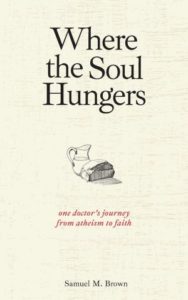 Samuel M. Brown. Where the Soul Hungers: One Doctor’s Journey from Atheism to Faith. Neal A. Maxwell Institute
Samuel M. Brown. Where the Soul Hungers: One Doctor’s Journey from Atheism to Faith. Neal A. Maxwell Institute
Though raised as a Latter-day Saint in Utah, Samuel M. Brown was an atheist from an early age, and proud of it. At least until God became an undeniable presence in his life. His conversion to the faith of his forbearers happened by degrees, and today he is joyfully living a life in Christ. In this volume, Sam narrates a number of the waypoints on his journey into believing and belonging. Some of those moments are dramatic, but many are composed of small and simple things, which take on profound significance as Sam reflects on them now in these pages. With gentle, self-critical humor and a generous regard for those who have accompanied him on his way, it is an offer to walk with you a while on your own journey of faith.
Samuel M. Brown is Professor of Pulmonary and Critical Care Medicine and Medical Ethics and Humanities at the University of Utah and an intensive care physician in the Shock Trauma ICU at Intermountain Medical Center. His books on Latter-day Saint history and theology include In Heaven as It Is on Earth: Joseph Smith and the Early Mormon Conquest of Death and Joseph Smith’s Translation: The Words and Worlds of Early Mormonism (Oxford University Press) and First Principles and Ordinances: The Fourth Article of Faith in Light of the Temple (Maxwell Institute).
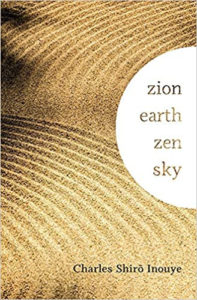 Charles Shirō Inouye. Zion Earth, Zen Sky. Neal A. Maxwell Institute
Charles Shirō Inouye. Zion Earth, Zen Sky. Neal A. Maxwell Institute
“I am Japanese but was born and raised in rural central Utah. At first, my parents were afraid that our involvement with the Church would weaken our grounding in Japanese tradition. As it turned out, it only reinforced my interest in animism, Buddhism, and other aspects of Japanese culture. As a scholar of Japanese culture, I have discovered that Latter-day Saint culture and Mahayana Buddhist culture are similar in many ways, and that the paths to the building up of Zion, on the one hand, and to Zen enlightenment, on the other, are one and the same. The genius of both faith traditions lies in how they push the abstract ideas of salvation down into the world of material practice. Raking sand in a Zen garden reminds us that mortality is similarly a “high maintenance” situation, where constant service is required if we are to grasp our purpose here on earth.”
Charles Shirō Inouye is a professor of Japanese literature and co-director of International Literary and Visual Studies at Tufts University. Educated at Stanford University, Kobe Daigaku, and Harvard University, he focuses his research on premodern and modern Japanese literature and on the role of visuality in the development of modern consciousness. Among his publications are In Light of Shadows: More Gothic Tales by Izumi Kyoka, The Similitude of Blossoms: A Critical Biography of Izumi Kyoka, and The End of the World, Plan B: A Guide for the Future.
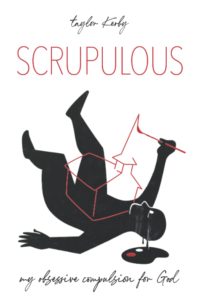 Taylor Kerby. Scrupulous: My Obsessive Compulsion for God. BCC Press
Taylor Kerby. Scrupulous: My Obsessive Compulsion for God. BCC Press
“I predict that Scrupulous will become an important resource for Latter-day Saints and others who struggle with a crippling anxiety disorder. It will give parents, teachers, counselors, and ecclesiastical leaders the tools they need to minister to people who are suffering tremendously. And it will help us all shift our conversations away from sin and repentance and towards mental disorder and treatment. This shift is essential, as it is impossible to break free from the chains of scrupulosity by simply repenting more and trying not to sin. Scrupulous is an abounding grace to those of us who are tired of being the chief of sinners.” Michael Austin, from the Foreword.
Taylor Kerby is professional educator living in the Phoenix area who seeks to foster critical thinking, meaningful connection, and awe in his students. He is a Ph.D. candidate at Grand Canyon University specializing in the relationship between flow and awe as it pertains to student achievement. He holds master’s degrees in Education and Religion from Claremont Graduate University.
 Allison Hong Merrill. Ninety-Nine Fire Hoops. She Writes Press
Allison Hong Merrill. Ninety-Nine Fire Hoops. She Writes Press
Allison Hong is not your typical fifteen-year-old Taiwanese girl. Unwilling to bend to the conditioning of her family’s patriarchal culture, she disobeys her father’s demand to stay in their faith tradition, Buddhism, and instead joins the Church of Jesus Christ of Latter-day Saints. Then, six years later, she drops out of college to serve a mission–a decision for which her father disowns her. After her mission she marries her American boyfriend. But sixteen months later, Allison returns home to their Texas apartment and is shocked to discover that, in her two-hour absence, her has taken all the money, moved out, and filed for divorce. Desperate for love and acceptance, Allison moves to Utah and enlists in an imaginary, unforgiving dating war against the bachelorettes at Brigham Young University, where the rules don’t make sense–and winning isn’t what she thought it would be.
Allison Hong Merrill was born and raised in Taiwan and arrived in the US at age twenty-two as a university student. She eventually learned English well enough to earn an MFA in Writing from Vermont College of Fine Arts, and she now writes in both Chinese and English, both fiction and creative nonfiction. She is a Pushcart Prize nominee, the Grand Prize winner of the 2019 MAST People of Earth writing contest, and first-place winner of the 2019 Segullah Journal writing contest. Her work can be found in the Life Story Anthology and Liahona Magazine (both based in Taiwan), Ensign Magazine, Flying South Literary Magazine, and Dialogue: A Journal of Mormon Thought. She lives in Orem, Utah with her husband and their three sons.
Religious Nonfiction
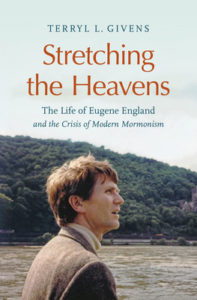 Terryl L. Givens. Stretching the Heavens: The Life of Eugene England and the Crisis of Modern Mormonism.University of North Carolina Press
Terryl L. Givens. Stretching the Heavens: The Life of Eugene England and the Crisis of Modern Mormonism.University of North Carolina Press
Eugene England, one of the most influential and controversial intellectuals in modern Mormonism, lived in the crossfire between religious tradition and reform. This biography shimmers with the personal tensions felt deeply by England during the turmoil of the late twentieth century. Drawing on unprecedented access to England’s personal papers, Givens paints a multifaceted portrait of a devout Latter-day Saint whose precarious position on the edge of church hierarchy was instrumental to his ability to shape the study of modern Mormonism. A professor of literature at Brigham Young University, England also taught in the Church Educational System. And yet from the sixties on, he set church leaders’ teeth on edge as he protested the Vietnam War and decried institutional racism and sexism. His last days, as he suffered from brain cancer, were marked by a spiritual agony that church leaders were unable to help him resolve.
Terryl L. Givens is Neal L. Maxwell Senior Fellow at Brigham Young University and Jabez A. Bostwick Professor of English Emeritus at the University of Richmond. He has previously won AML awards in criticism for People of Paradox: A History of Mormon Culture, in biography for Parley P. Pratt: The Apostle Paul of Mormonism (with Matthew J. Grow), in devotional literature for The God Who Weeps: How Mormonism Makes Sense of Life (with Fiona Givens), and in scholarly publishing for The Oxford Handbook of Mormonism (with Phillip L. Barlow).
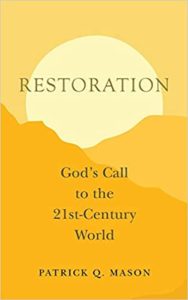 Patrick Q. Mason. The Restoration: God’s Call to the 21st Century World. Faith Matters
Patrick Q. Mason. The Restoration: God’s Call to the 21st Century World. Faith Matters
The Restoration began in the spring of 1820, when Joseph Smith saw God the Father and Jesus Christ. Joseph had questions, and Jesus had answers. As the Restoration enters its third century, the world has new questions. A loving God has answers. In Restoration, Patrick Mason reflects on what it means for members of the Church to participate in the ongoing Restoration. Every generation must rediscover the gospel anew, and this book breathes new life into well-worn terms and phrases. What does it mean to restore Israel? How can a church with less than one percent of the world’s population be true? What baggage have we picked up these past two centuries, and how do we move forward with confidence, relevance, and impact? The Restoration was intended to bless all of our Heavenly Parents’ children, especially the marginalized and vulnerable among us. This book will inspire and challenge you to rethink, recommit, and respond to God’s call to the 21st-century world.
Patrick Q. Mason is the author of several books for Latter-day Saint and academic audiences, including Planted: Belief and Belonging in an Age of Doubt, and What Is Mormonism?: A Student’s Introduction, which won the 2017 AML Religious Nonfiction Award. Mason is an associate professor of religious studies and history at Utah State University, where he holds the Leonard J. Arrington Chair of Mormon History and Culture. He was trained in American history at BYU and Notre Dame, was a Fulbright Scholar in Romania, has served on the boards of the Mormon History Association and Dialogue Foundation, and is an advisor and contributor to Faith Matters. He lives with his wife and four children in Logan, Utah.
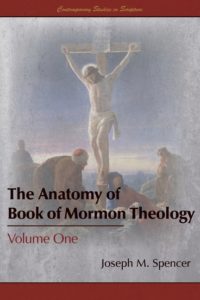 Joseph M. Spencer. The Anatomy of Book of Mormon Theology, Vols. 1 and 2. Greg Kofford Books
Joseph M. Spencer. The Anatomy of Book of Mormon Theology, Vols. 1 and 2. Greg Kofford Books
Few scholars of the Book of Mormon have devoted as much time and effort as Spencer to a theological reading of that sacred text–that is, “how it might shape responsible thinking about questions pertaining to the life of religious commitment”. The Anatomy of Book of Mormon Theology divides into two volumes exploring and thinking about these pertinent questions. Each concerns a different part of the defense of the claim that theology is and ought to be particularly important for Book of Mormon studies. In the first volume, Spencer gathers essays about why theology is important to Book of Mormon scholarship and how to ensure that it does not overstep its boundaries, as well as essays on the central question of Christ’s atonement and other traditional theological topics, as the Book of Mormon understands them. The essays in the second volume ask about what new worlds might be discovered in doing theological work on the Book of Mormon, focusing on what Spencer calls “microscopic” and “macroscopic” theological readings of the text.
Joseph M. Spencer is a philosopher and an assistant professor of ancient scripture at Brigham Young University. He is the author of dozens of articles and four books on philosophy and Latter-day Saint scripture. In addition, he serves as the editor of the Journal of Book of Mormon Studies, as the associate director of the Latter-day Saint Theology Seminar, and as a vice president of the Book of Mormon Studies Association. He was a series editor of the Maxwell Institute’s The Book of Mormon: Brief Theological Introductions and authored the 1st Nephi volume from that series. He and his wife live in Provo with their five children.
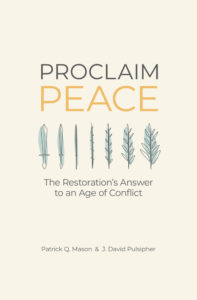 Patrick Q. Mason and J. David Pulsipher. Proclaim Peace: The Restoration’s Answer to an Age of Conflict. Maxwell Institute
Patrick Q. Mason and J. David Pulsipher. Proclaim Peace: The Restoration’s Answer to an Age of Conflict. Maxwell Institute
This book is a spiritual journey by two believing scholars of peace. In a world plagued by violence, Mason and Pulsipher believe, with President Russell M. Nelson, that “peace is possible” and that the “descendants of Abraham . . . are in a pivotal position to emerge as peacemakers”. It is an effort to lift up the Restoration’s distinctive principles that invite us to renounce violence and proclaim Christ’s good news of love and peace to a world that desperately needs it. It seeks not to promote any particular ideology, but to invite readers, especially the rising generation, to reflect on the interpersonal, ethical, and social dimensions of Christian discipleship.
Patrick Q. Mason (see above).
David Pulsipher is a professor of history at Brigham Young University–Idaho, where he teaches courses on citizenship, civil discourse, peace-building, and nonviolence. He received a Ph.D. in American Studies from the University of Minnesota.
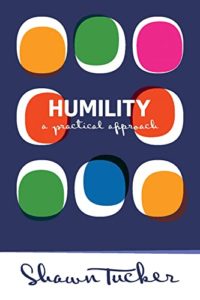 Shawn Tucker. Humility: A Practical Approach. BCC Press
Shawn Tucker. Humility: A Practical Approach. BCC Press
A king who is a poor judge of character. A gigantic foam finger in sacrament meeting. An elevator that does not go to the top floors. Dementors. The Missionary Guide used by missionaries in the 80s and 90s. A risqué encounter between two Greek gods. A mastodon hunter named Doug who is the reason you sometimes feel inadequate. This book combines all of these and more to explore qualities like devotion to God, meekness, vulnerability, seeing your weaknesses, respect, modesty, and friendship as well as self-righteousness, willful blindness, hypocrisy, enmity, and pride. Its stories and analysis provide practical insights into what it means to be humble in your relationship with God and in your relationships with others.
Shawn Tucker teaches Humanities at Elon University in North Carolina. His scholarly interests include laughter, pride and humility, and the virtues and vices in the arts, and Radiohead. He earned MA and PhD degrees in Humanities from Florida State University. He and his wife Nicole have four children and two grandchildren.
Special Award in Nonfiction
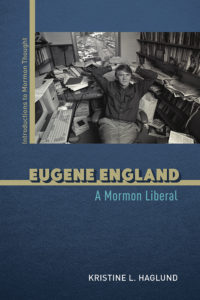 Kristine L. Haglund. Eugene England: A Mormon Liberal. University of Illinois Press
Kristine L. Haglund. Eugene England: A Mormon Liberal. University of Illinois Press
The judges in the Criticism and Religious Nonfiction categories both requested that this book be honored with a special award. An award citation will be announced at the AML Conference.
Eugene England championed an optimistic Mormon faith open to liberalizing ideas from American culture. At the same time, he remained devoted to a conservative Mormonism that he saw as a vehicle for progress even as it narrowed the range of acceptable belief. Kristine L. Haglund views England’s writing through the tensions produced by his often-opposed intellectual and spiritual commitments. Though labeled a liberal, England had a traditional Latter-day Saint background and always sought to address fundamental questions in Mormon terms. His intellectually adventurous essays sometimes put him at odds with Church authorities and fellow believers. But he also influenced a generation of thinkers and cofounded Dialogue, a Mormon academic and literary journal acclaimed for the broad range of its thought. A fascinating portrait of a Mormon intellectual and his times, Eugene England reveals a believing scholar who emerged from the lived experiences of his faith to engage with the changes roiling Mormonism in the twentieth century.
Kristine L. Haglund is a writer, editor, and independent scholar, and the former editor of Dialogue: A Journal of Mormon Thought. She holds degrees in German Literature from Harvard and the University of Michigan. She was a series editor of the Maxwell Institute’s The Book of Mormon: Brief Theological Introductions.
